Effective planning is an essential element in the pursuit of productivity and success. When you take the time to organize your day, establish priorities, and create a clear roadmap for your tasks, you unlock the potential to achieve more with greater efficiency.
This guide aims to delve into the art of how to plan your day, emphasizing the significance of this practice. We will provide practical tips and strategies to assist you in crafting an effective daily plan, enabling you to make the most of your time. Additionally, we will address common questions and concerns that often arise in relation to this topic.
By the end of this guide, you will be equipped with the knowledge and tools necessary to enhance your daily productivity and achieve your goals with greater ease.
The Importance of Planning Your Day for Productivity and Goal Achievement
Planning your day is a crucial practice that benefits individuals regardless of their professional roles. Whether you’re an entrepreneur, freelancer, or employee, planning your day is essential for boosting productivity and attaining your goals. You risk struggling with efficiency and hindering your progress by neglecting to plan.
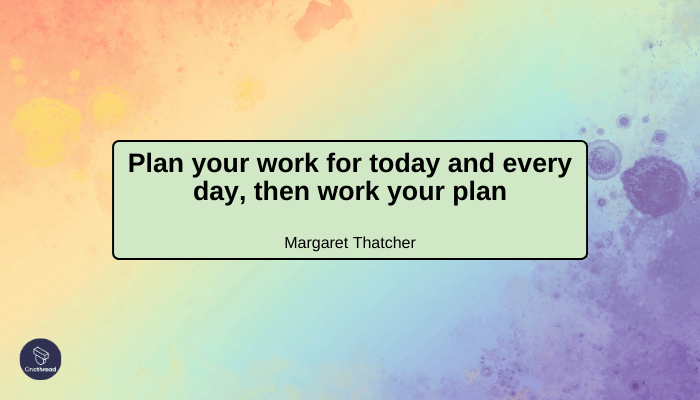
Effective planning starts with identifying the tasks you wish to accomplish and estimating the required time. Breaking down these tasks into smaller, manageable steps and assigning time frames allows you to maintain focus and minimize distractions. This systematic approach helps you remain on track, ensuring that important responsibilities are not overlooked.
Planning your day fosters a productive mindset, leading to heightened overall efficiency. It serves as a source of motivation and aids in attaining your objectives. By creating a clear roadmap for your daily activities, you can effectively steer away from distractions, prioritize tasks, and regain a sense of control over your life.
The Skills and Benefits of Daily Planning
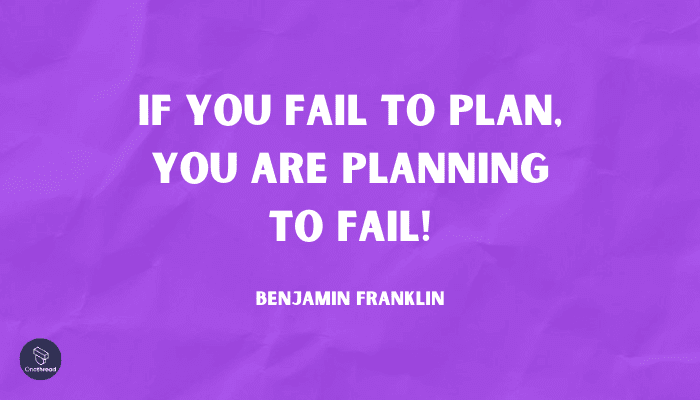
While planning a day may initially seem challenging, developing this skill proves highly advantageous. Although it takes time to master the art of organizing your day, the benefits far outweigh the investment.
To begin, it is crucial to identify your sources of motivation and establish life goals that guide how you allocate your time over the next 24 hours. Once these priorities are set, it is time to compile a comprehensive list of tasks that need to be accomplished.
Through this process, you cultivate valuable planning skills that empower you to structure your day effectively. Taking control of your schedule can optimize your time management and increase your overall productivity.
Furthermore, planning your day enables you to adapt to unexpected circumstances and make necessary adjustments without sacrificing your goals.
How To Plan Your Day To Be Productive? 10 Effective Strategies for Daily Planning
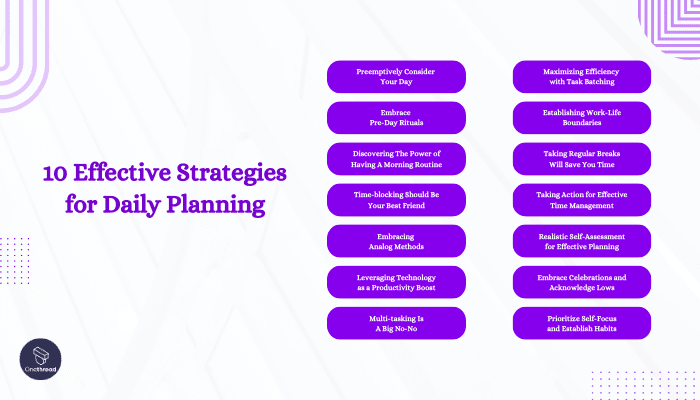
Planning your day is a vital practice that can significantly impact your productivity and overall success. By following practical solutions, you can optimize your time and skills to achieve the best possible outcomes.
#1. Preemptively Consider Your Day
To avoid wasting time and energy on unimportant tasks, start by identifying your goals and creating a list of tasks to be accomplished. Setting priorities for each task allows for a systematic approach, ensuring you tackle the most crucial tasks first.
Effective planning empowers you to manage your work and personal life more efficiently. It reduces stress and anxiety, allowing for better time management and increased productivity.
#2. Embrace Pre-Day Rituals
While many believe that productivity requires longer work hours, creating time for yourself and enhancing productivity through efficient planning is crucial. Establishing pre-day rituals can be a game-changer. Consider practices such as making a task list or planning your day ahead of time.
The key is to find and stick to a routine that resonates with you. By doing so, you can accomplish more in less time, enhancing your overall productivity.
Remember to allocate time for organizing tasks based on their importance and estimated duration.
Maintaining a productive mindset is paramount. Believing in your productivity lays the foundation for achieving optimal results.
#3. Discovering The Power of Having A Morning Routine
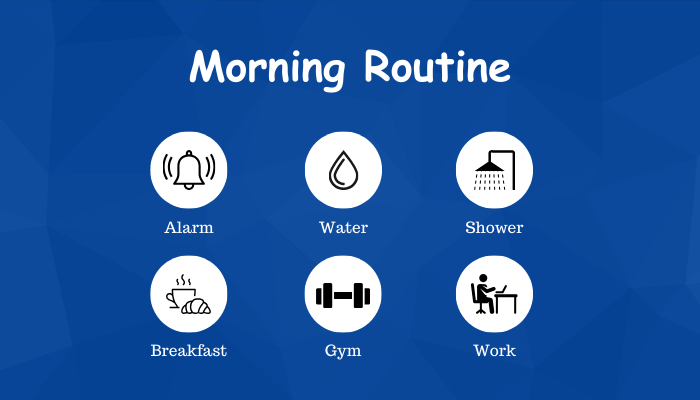
A morning routine establishes a positive tone for your day. Incorporating activities like exercise, meditation, or journaling sets the stage for productivity and focus. It primes your mind for challenges ahead and boosts your energy levels.
Creating a consistent routine enhances your mental and emotional well-being, reducing stress and anxiety. This practice also offers a quiet moment for self-reflection and personal growth.
Starting your day with intention and mindfulness helps you approach your tasks with clarity and enthusiasm, ensuring a more prosperous and fulfilling day ahead.
#4. Time-blocking Should Be Your Best Friend
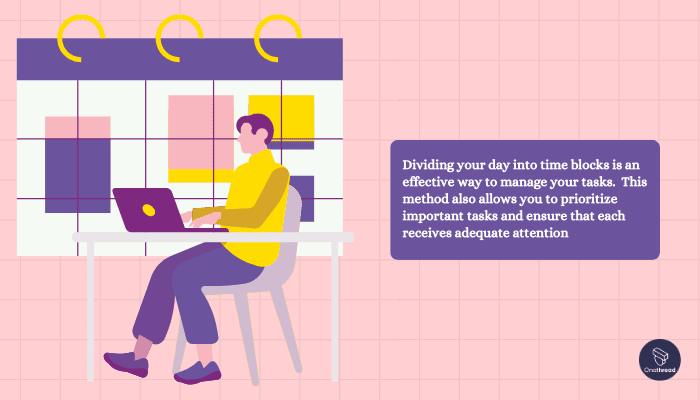
Dividing your day into time blocks is an effective way to manage your tasks. Assign specific periods for activities such as focused work, meetings, and breaks.
Time blocking prevents tasks from sprawling and keeps you on track. It improves your time management by encouraging discipline and creating a structured schedule.
This method also allows you to prioritize important tasks and ensure that each receives adequate attention. Adhering to allocated time blocks, you maintain a balance between tasks, reduce procrastination, and maximize your overall productivity.
#5. Embracing Analog Methods
In a world driven by technology, achieving effective daily planning requires a return to analog practices. While it has become ingrained in human nature to rely on technology for problem-solving, true transformation, and meaningful progress necessitate internalization.
To master the art of planning your day, take a moment to grab a piece of paper and note down your goals, the strategies to achieve them, and the desired outcomes for a successful day. This act of writing provides a break from the hyper-fast digital world, offering a few minutes of solitude to gain a clearer perspective on your current position and the direction you need to take before diving into your day.
#6. Leveraging Technology as a Productivity Boost

While occasional breaks from technology are beneficial, completely abandoning it is not recommended. Instead, embrace tools like OneThread, which enhance your efficiency and effectiveness in managing time and tasks.
Onethread offers a convenient way to organize all your daily tasks in one centralized platform, ensuring enhanced daily productivity. You can stay on track and maintain a steady workflow by setting reminders for specific tasks.
This powerful tool aids in planning your day by prioritizing tasks, monitoring progress, and sending timely reminders. With OneThread, you can optimize your productivity, efficiently allocate time, and take significant steps toward achieving your goals. Don’t miss out on the opportunity—sign up for OneThread now!
#7. Multi-tasking Is A Big No-No
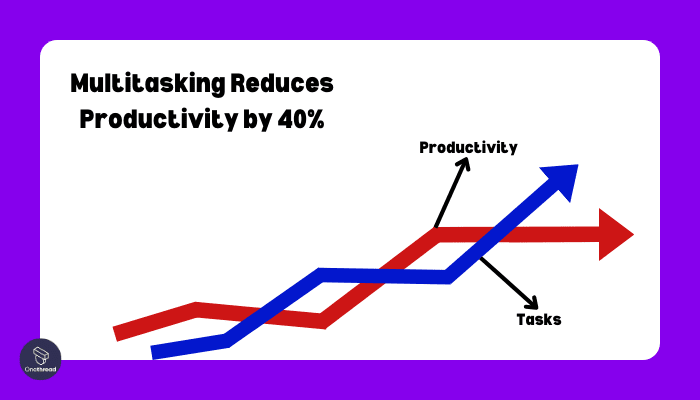
Limiting multitasking enhances productivity and quality. Focusing on one task at a time allows you to dedicate your full attention and energy, leading to better results.
Multitasking can lead to mistakes and increased stress, hindering your overall efficiency. Concentrating on a single task lets you complete it more quickly and move on to the next with a clearer mind. Embrace deep work by immersing yourself in one task, and watch your productivity soar.
#8. Maximizing Efficiency with Task Batching
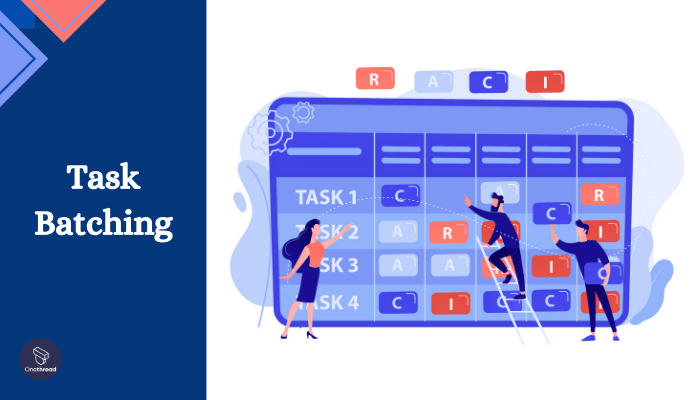
Task batching involves consolidating similar tasks to be completed together, minimizing the need to switch between programs or areas. It is a time-saving technique that can significantly boost productivity.
For instance, a photographer resizing all her recent wedding images at once instead of individually editing and resizing each one showcases the simplicity of task batching. By grouping similar tasks together, you save both time and energy in most cases.
However, it’s important to recognize that batching may only sometimes be suitable. Here are situations where task batching can be advantageous and instances when it’s better to focus on one task at a time.
#9. Establishing Work-Life Boundaries
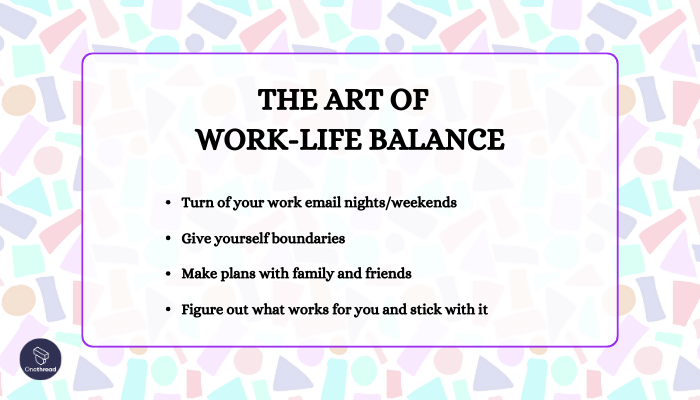
Managing time effectively requires acknowledging that there is no universal approach that fits everyone. Each person has their own unique work style and personality. Understanding your personal preferences, strengths, and weaknesses is key to achieving success.
One effective method for managing your day is to establish clear boundaries between work and everyday life. By doing so, you can prioritize tasks based on the available time you have in a day.
Setting boundaries also allows you to give due importance to tasks that need to be addressed before or after work hours, such as family commitments or exercise.
#10. Taking Regular Breaks Will Save You Time
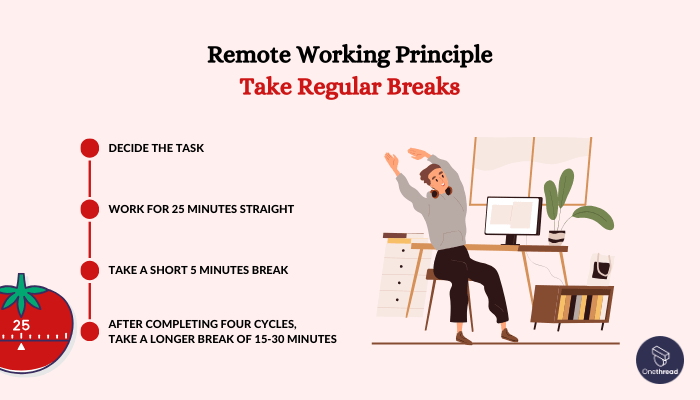
Taking regular breaks throughout your day is crucial for maintaining productivity and well-being. Short breaks allow you to rest your mind, recharge, and prevent burnout.
Breaks can improve your focus, creativity, and decision-making skills. Whether it’s a quick walk, deep breathing exercises, or a moment of relaxation, these intervals enhance your overall efficiency.
Breaks also foster a healthier work environment, encouraging better mental and physical health. Incorporate breaks strategically into your day to ensure you’re working at your best and avoiding the harmful effects of continuous, prolonged work without rest.
#11. Taking Action for Effective Time Management
Learning to take action is crucial for achieving productivity. It involves mastering the art of organizing and managing your time effectively.
Planning your day is a critical step in maximizing productivity. By carefully organizing your tasks, you can ensure that you allocate your time efficiently, avoiding unnecessary time wastage and focusing on what truly needs to be done.
#12. Realistic Self-Assessment for Effective Planning
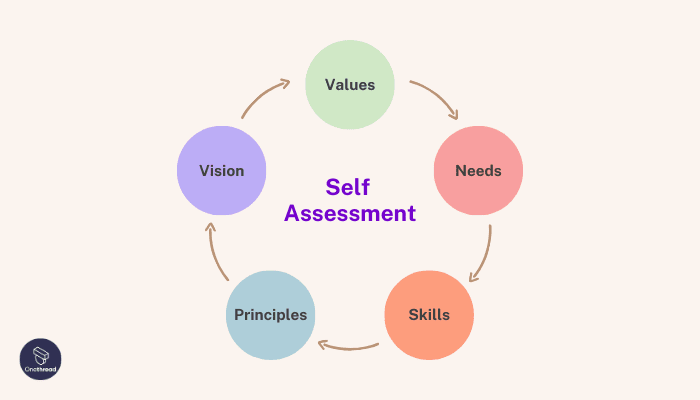
Understanding your personal attributes, strengths, and weaknesses is essential for effective time management and task organization.
To plan a productive day, start by assessing how much time you have available. Additionally, be aware of the hours you typically spend on various activities such as sleep, work, meals, and socializing.
While striving for productivity is important, it’s equally crucial to have a realistic assessment of yourself. Recognize your limitations and know when to push beyond them and when to avoid overexertion.
#13. Embrace Celebrations and Acknowledge Lows
Taking time for self-celebration and accepting your lows is crucial, especially when striving for increased productivity.
Managing time and staying focused on work can be challenging for many individuals. However, there are strategies to enhance productivity and maintain motivation amidst a heavy workload.
Planning and organizing your day saves time, reduces stress, and helps you prioritize tasks effectively. By following a schedule, you can allocate sufficient time to celebrate your successes and acknowledge any mistakes or low points that occur throughout the day.
#14. Prioritize Self-Focus and Establish Habits
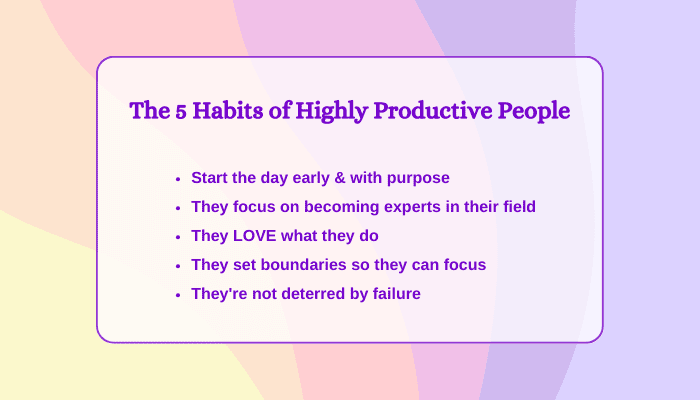
To achieve success, it is vital to maintain focus and prioritize your own needs. Daily planning and effective time management play pivotal roles in boosting productivity.
You can stay on track and streamline your work by setting up supportive habits. Time management involves dedicating ample time to completing critical tasks, ensuring your focus remains unwavering.
Conclusion
Here is all about how to plan a day to be productive. Planning your day is a valuable skill that significantly enhances your productivity and overall well-being. By organizing your tasks, setting priorities, and allocating your time effectively, you can approach each day with clarity, purpose, and focus.
Remember to be flexible and adaptable, allowing room for unforeseen circumstances and adjustments as needed. With consistent practice and commitment, you can master the art of daily planning and unlock your full potential.
Take control of your productivity today! Discover the power of effective planning with OneThread. Start optimizing your day now for increased efficiency and success. Try Onethread for free and revolutionize how you plan your day.
Frequently Asked Questions
How Do I Stay Motivated And Focused Throughout The Day?
To stay motivated and focused throughout the day, set clear goals for yourself and break them down into smaller, manageable tasks. Take regular breaks, practice mindful breathing, and eliminate distractions to maintain your focus.
What Are Some Effective Strategies For Dealing With Distractions And Interruptions?
To effectively deal with distractions and interruptions, prioritize your tasks, set specific goals, and create a conducive work environment. Minimize external disruptions, use time-blocking techniques, and practice mindfulness to stay focused on the task at hand.
How Can I Effectively Manage My Energy Levels Throughout The Day?
To effectively manage your energy levels throughout the day, try prioritizing tasks based on their importance and urgency. Take regular breaks, engage in physical activity, eat nutritious meals, and ensure you get sufficient rest at night.
What Are Some Tips For Maintaining A Healthy Work-Life Balance While Planning My Day?
To maintain a healthy work-life balance while planning your day, prioritize your tasks and set boundaries. Delegate when possible, take breaks and make time for self-care activities to recharge and reduce stress.
How Can I Handle Unexpected Tasks Or Changes To My Schedule That Arise During The Day?
To handle unexpected tasks or changes to your schedule during the day, prioritize and reorganize your tasks accordingly. Stay flexible, adjust your plans if necessary, and remember to delegate or ask for help when needed.
